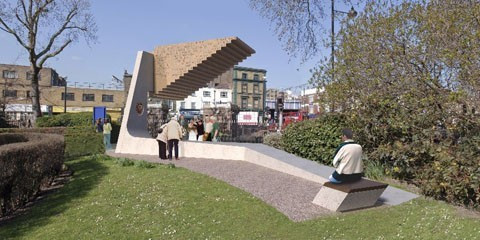Wartime Disaster Memorial Unveiled in London's Bethnal Green

The worst civilian disaster of the Second World War was commemorated on Sunday 3 March, the 70th anniversary of the Bethnal Green Tube disaster in London's East End.
A total of 173 people, including 62 children, died in a crush on 3 March 1943, when people rushed to enter the station after hearing air-raid sirens.
The victims believed bombs were falling but the alarm was a test siren.
A service will take place at St John on Bethnal Green Church, east London, followed by a procession to the memorial.
On the fateful night, an anti-aircraft battery in nearby Victoria Park launched a salvo of anti-aircraft rockets.
In the pitch dark of a blackout, working her way down the temporary steps that night, one lady carrying a child fell. This caused the crowds to surge forward and hundreds of people were crushed in the panic.
To keep morale high, wartime reporting was heavily censored, leading to accusations of a government cover-up.
Father Alan Green, who led the service, said it was cathartic to honour the victims given the original blanket ban on information.
"The problem with the previous memorial and the cover up was the names were not publicly acknowledged so each year we have centred on reading out those names and lighting 173 candles which we place on the altar to mark those lives," he told the BBC.
A plaque was placed at the station in the 1990s but the first section of a new Stairway to Heaven monument has now been completed.
"With the completion of the first stage of the memorial there is a real sense of achievement of marking this for those who died and those who survived," said Father Green.
Dr Toby Butler from the University of East London added: "It [the plaque] was rather inadequate considering this disaster was worse than Hillsborough, worse than Aberfan. The scale of it is truly extraordinary."
He is leading a project to record the memories of survivors and rescuers, and the relatives of those who died.
Dr Butler said: "Most of the people that died in this disaster were women and children. It was a huge hole in the community in Bethnal Green.
"Some people still can't speak about it because it was just so incredibly traumatic."
His interviews will form part of an audio guide for visitors to the monument.
He said the Bethnal Green Memorial Trust still needs to raise about £100,000 for a canopy for the memorial.
He added: "It's going to be an incredibly important landmark in east London."
Harry Paticas, a local architect, has designed the memorial at the entrance to east London's Bethnal Green tube station.
"Where it was placed was just the sort of spot that people would rush past on their daily commute," Paticas said. "I was determined to find out more about the disaster and I couldn't understand why such a great loss of life warranted only a small plaque. I felt sure there was a way to use my skills as an architect to help create a fitting tribute for these people and their families."
Every piece of material that has been used in the memorial has a story behind it. The wood that will make the stairwell canopy is perhaps the most unusual.
"The canopy will be made from reclaimed teak recovered from a ship that was sunk in World War I," Mr Paticas explained. "We wanted to use wood because it is a soft, gentle material appropriate for a memorial. But, it had to withstand the elements, so we needed to find a sustainable hard wood source, which we did. I just didn't expect it to come from the bottom of the Irish Sea."
Secretary of the Stairway to Heaven Memorial Trust Sandra Scotting lost a grandmother and cousin in the disaster, while her mother was one of those rescued alive.
She said that the tragedy devastated a generation in her community and praised the work done by Paticas for the charity. "He's poured his heart and soul into the project - it's even better than we could have imagined," she said.
"His attention to detail has been breathtaking and the symbolism in his choices of shape and materials has created something people will definitely be moved by. The survivors and their families have waited 70 years for this."
© Copyright IBTimes 2024. All rights reserved.























